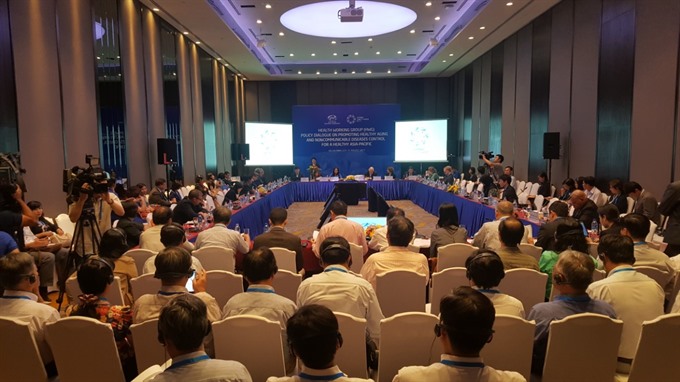 Society
Society

A Vietnamese expert addressed an APEC event yesterday on one of the region and world’s most significant demographic developments: rapidly aging populations.
 |
| Delegates from APEC economies take part Tuesday in the Health Working Group’s Policy Dialogue on non-communicable disease control. The dialogue took place in HCM City as part of APEC’s Senior Third Meeting. VNS Photo by Hoàng Nam |
HCM City – A Vietnamese expert addressed an APEC event yesterday on one of the region and world’s most significant demographic developments: rapidly aging populations.
Vietnamese Deputy Minister of Health Assoc Prof Phạm Lê Tuấn, chaired the Health Policy Dialogue on “Promoting healthy aging and non communicable diseases control for a healthy Asia Pacific.” Speaking at the event yesterday, he said: “On average there are two people reaching the age of 60 every second, meaning every year the world welcomes approximately 58 million people over age 60.”
The number of older persons would increase from more than 900 million now to two billion by 2050.
While the development is global, it is affecting APEC members especially rapidly. APEC members account for 40.5 per cent of the world’s population, but elderly APEC residents account for nearly half the world’s senior citizens.
APEC economies are among those with the most rapidly ageing populations in the world.
“This great demographic transition brings great opportunities and challenges, affecting all aspects of the socio-economy of every nation, APEC member economy, every community and every family,” he added.
Việt
There are now more than 10 million seniors in Việt
The rise of non-communicable diseases in the context of a rapidly ageing population poses a major challenge to the global healthcare system, he said.
“Cardiovascular diseases, diabetes, cancer, and chronic diseases are the leading causes of increased morbidity and mortality among the elderly, and preventing and controlling non-communicable diseases is one of the priorities of APEC member economies,” he said.
The Health Policy Dialogue was as an opportunity for health managers, scientists, organisations and individuals to learn from each other’s experiences tackling non- communicable diseases and discuss practical measures to fight them. The dialogue took place in HCM City as part of APEC’s Senior Third Meeting. -- VNS